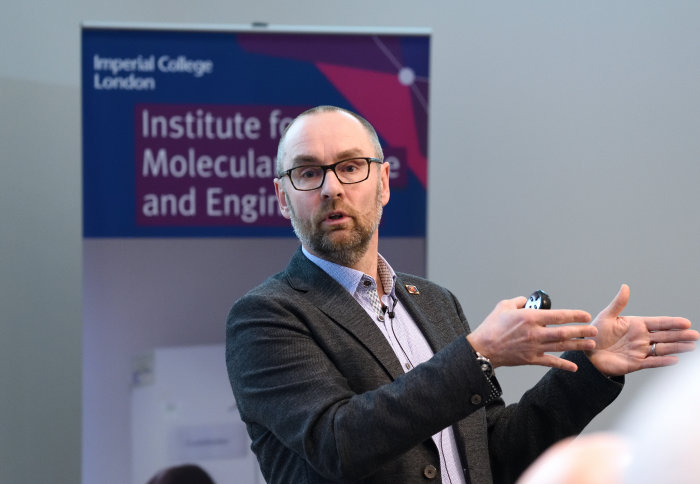Senior Vice President of GSK talks drug discovery at IMSE's first annual lecture

Tony Wood, Senior Vice President of GlaxoSmithKline delivers the IMSE Annual Lecture of 2019.
Tony Wood gave an insight into how multinational pharmaceuticals are designing the smart drugs of the future.
One of the research leaders at pharmaceutical giant GlaxoSmithKline, and one of the world’s pre-eminent medicinal chemists, Tony Wood gave the inaugural Institute for Molecular Science and Engineering's Annual Lecture.
Wood, Senior Vice President, Medicinal Science & Technology in GSK, has previously played a leading role in the discovery of Maraviroc, a treatment of HIV, has considerable background in the pharmaceutical industry.
In recognition for his role in Maraviroc, he was awarded the RSC Malcolm Campbell Prize in 2005. He was also co-recipient of the ACS Heroes of Chemistry Prize, the Prix Galien USA and Scrip Awards in 2008, and the PhRMA Discoverers Award in 2010. In 2018 he was elected as a Fellow of the Academy of Medical sciences.
His lecture was introduced by Imperial's Provost Professor Ian Walmsley, and Co-director of the IMSE, Professor Nic Harrison.
"The industry has to change"
Drug discovery and development has changed over the past decade. According to Wood, higher expectations from patients that medicines are accessible and convenient to use presents a great challenge for pharmaceuticals.
However, in one of the most revealing insights given by Wood during his IMSE Annual Lecture, the sector assumes a 90% failure rate in the development of new drugs, usually after millions of pounds have been spent, which in Wood's view “has to change”.
The challenge is how to get the ‘right’ high-quality data? Facebook ‘likes’ generate excellent data for analysis; there are lots of examples for very specific things. However genetic data is the opposite: lots of variation and few examples. Tony Wood Senior Vice President, G
Possible solutions to such large failure rates include big data, artificial intelligence and machine learning. Data science underpins modern development of new medicines. Genetic data about the wider population, coupled with knowledge of specific genes and an ability to edit them could lead to more effective and better targetted medicines.
Data crunched by artificial intelligence helps geneticists focus their cell and molecule research more precisely, and conduct it on a much smaller scale, making future drug discovery more productive.
According to Wood, the development of new medicines from genetic research is a community effort. A key part of the UK’s life sciences strategy is to encourage patients to engage more in mass research projects, in which Wood argues the NHS would have a powerful role in encouraging.

Indeed Tony Wood argues the UK can be a world leader in life sciences in the future due to "the depth of scientific research, the strength of the pharmaceutical industry, and the critical role of the NHS as a single payer; a unique combination of circumstances".
The lecture concluded with a vote of thanks by Professors Claire Adjiman and Nic Harrison, Co-Directors of the Institute. Claire and Nic praised Tony for his excellent demonstration of bringing multidisciplinary research to the fore in solving major challenges in the Pharma industry.
About IMSE
The Institute for Molecular Science and Engineering (IMSE) is one of Imperial College London's Global Institutes, drawing on the strength of its four faculties to address some of the grand challenges facing the world today. The Institute's activities are focused on tackling problems where molecular innovation plays an important role.
The Highlight Seminar Series brings eminent speakers from across the globe to Imperial to increase awareness of areas where molecular science and engineering can make a valuable contribution and to promote exchanges with academic and industrial centres of excellence.
Article text (excluding photos or graphics) © Imperial College London.
Photos and graphics subject to third party copyright used with permission or © Imperial College London.
Reporter
Dr Kieran Brophy
Faculty of Engineering